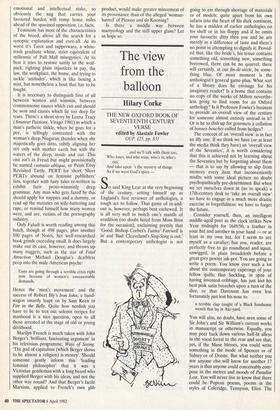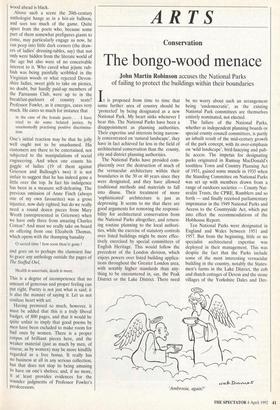The view from the balloon
Hilary Corke
THE NEW OXFORD BOOK OF SEVENTEENTH CENTURY VERSE edited by Alastair Fowler OUP, 12.5, pp. 831
and we'll talk with them too, Who loses, and who wins; who's in, who's out; And take upon 's the mystery of things As if we were God's spies —
So said King Lear at the very beginning of the century, setting himself up as England's first reviewer of anthologies, a tough act to follow. That game of in-and- out is, however, perhaps best eschewed. It is all very well to twitch one's mantle of erudition (no doubt hired from Moss Bros for the occasion), exclaiming prettily that `Good: Bishop Corbet's Fairies' Farewell is in' and 'Bad: Cleaveland's Sing-Song is out.' But a contemporary anthologist is not going to err through shortage of materials or of models: quite apart from his own safaris into the heart of his dark continent, he has a midden of earlier anthologies on his shelf or in his floppy and if he omits your favourite ditty then you and he are merely in a difference of taste and there's no point in attempting to dignify it. Provid- ed that, like the bride's, his tenue contains something old, something new, something borrowed, there can be no quarrel; there will certainly, at our fin-de-siecle, be some- thing blue. Of more moment is the anthologist's general game-plan. What sort of a library does he envisage for his imaginary reader? Is a home that contains no copy of the works of Milton neverthe- less going to find room for an Oxford anthology? Is it Professor Fowler's business to provide an overall view of the century for someone almost entirely unread in it? Or is he to dish up for gourmets a collation of bonnes-bouches culled from hedges?
The concept of an 'overall view' is in fact an iffy one. If we think we have (or at least the media think they have) an 'overall view of the Seventies', it is worth considering that this is achieved not by learning about the Seventies but by forgetting about them — that is to say by allowing to slip from memory every item that inconveniently misfits with some ideal picture no doubt psychopathically pre-determined. But when we set ourselves down at (so to speak) a 17th-century desk to 'take an overall view' we have to engage in a much more drastic exercise in forgetfulness: we have to forget the future.
Consider yourself, then, an intelligent middle-aged poet as the clock strikes New Year midnight for 1649/50, a feather in your hat and another in your hand — or at least in my own hat, for I seem to see myself as a cavalier; but you, reader, are perfectly free to go roundhead and squat, unwigged, in plain broadcloth before a great grey pewter ink-pot. You are going to write a poem. You know ever such a lot about the contemporary caperings of your fellow quills: that Suckling, in spite of having invented cribbage, has just lost his best pink satin breeches upon a turn of the dice, or that Davenant has even less fortunately just lost his nose to
a terrible clap caught of a Black handsome wench that lay in Axe-yard.
You will also, no doubt, have seen some of Sir John's and Sir William's current works in manuscript or otherwise. Equally, you may peer back down various half-lit alleys in the vocal forest to the rear and see that, yes, if the Muse blesses, you could write something in the mode of Spencer or of Sidney or of Donne. But what neither you nor anyone else will know for another 17 years is that anyone could conceivably com- pose in the metres and moods of Paradise Lost. You will never live to know that there could be Popean poems, poems in the styles of Coleridge, Tennyson, Eliot. The
wood ahead is black.
Above such a scene the 20th-century anthologist hangs as in a hot-air balloon, and sees too much of the game. Quite apart from the poets who, because some part of them somewhat prefigures giants to come, may particularly engage us now, he can peep into little dark corners (the draw- ers of ladies' dressing-tables, say) that not only were hidden from the literate world of the age but also were of no conceivable interest to it. Who cared what jejune rub- bish was being painfully scribbled in the Virginian woods or what rejected Devon- shire ladies, sweet girls to take on picnics, no doubt, but hardly paid-up members of the Parnassus Club, were up to in the breakfast-parlours of country seats? Professor Fowler, as it emerges, cares very much. He cares so much for instance that
in the case of the female poets . . . I have tried to do some belated justice, by unashamedly practising positive discrimina- tion.
One's initial reaction may be that he jolly well ought not to be unashamed. His customers are there to be entertained, not subjected to the manipulations of social engineering. And when one counts his gaggle of ladies (19 of them against Grierson and Bullough's two) it is not unfair to suggest that he has indeed gone a little over the top. In fact his indulgence has been in a measure self-defeating. The previous omission of Anne Finch (always one of my own favourites) was a gross injustice, now duly righted; but do we really need a round dozen pieces from Mary Wroth (unrepresented in Grierson) when we have only three from amazing Charles Cotton? And must we really take on board an offering from one Elizabeth Thomas, which opens with the thumping banality
0 sacred time ! how soon thou'rt gone !
and goes on to perhaps the clumsiest line to grace any anthology outside the pages of The Stuffed Owl,
Health is uncertain, death is more.
This is a degree of incompetence that no amount of generous and proper feeling can put right. Poetry is not just what is said; it is also the manner of saying it. Let us not confuse heart with art.
Having premised so much, however, it must be added that this is a truly liberal budget, of 800 pages, and that it would be quite unfair to imply that good poems by men have been excluded to make room for bad ones by women. There is a proper corpus of brilliant pieces here, and the weaker material (just as much by men, of course, as by women) may be more kindlily regarded as a free bonus. It really has no business at all in any serious collection, but that does not stop its being amusing to have on one's shelves; and, if no more, it at least provides evidences for the sounder judgments of Professor Fowler's predecessors.



























































 Previous page
Previous page